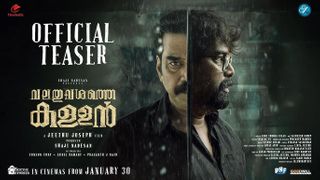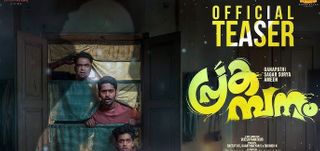Nizhalkkuthu Movie Review
Adoor Gopalakrishnan's Nizhalkkuthu (Shadow Kill) is far and away the most demanding of the 18 films that constitute the 2003 Indian Panorama. It is pure Adoor. It is cinema that explores recesses of the human consciousness that lesser filmmakers can only aspire to grasp.
But in Nizhalkkuthu - a moving moral allegory that addresses the questions of human responsibility and freedom through the tale of a guilt-ridden hangman of the pre-Independence era princely Travancore province - Adoor has cast the net wider than he ever done before. He employs music (Ilaiyaraja) as a full-fledged narrative element, injects an air redolent with lyricism into the tale and even falls back on the visual sweep of the Cinemascope format.
At its core, however, the brilliantly shot Nizhalkkuthu (camera: Ravi Varma and Sunny Joseph) remains true to the director's creative commitments. Adoor's hangman, Kaliyappan (played aptly by character actor Oduvil Unnikrishnan), isn't the fearsome ogre of popular imagination. He is a real human being, an old, infirm family man, wracked by memories of the execution of an innocent young man 25 years ago. When he is summoned to the capital for another hanging, the past comes rushing back. The consequences are tragic.
The apparent simplicity of the story is broken in the last quarter of the film as the line between dream and reality, the conscious and the subconscious is blurred in the fevered imagination of a drunken Kaliyappan. The characterization itself is replete with contrasts: the hangman's rope, which kills the condemned, also cures the sick. The rope has curative powers: when burnt before an image of Goddess Kali it yields a magical ash that can drive away human ailments.
Kaliyappan himself is a reflection of Goddess Kali: he is both a destroyer and a protector. As he cures others, he himself sinks further and further into mental anguish and physical indisposition. The dichotomy inherent in his condition is underscored all through the film. The hangman lives outside the village, on the fringes of society, but he is entitled to special treatment from the King. His job is to carry out the ruler's decree, but he cannot escape the onus of responsibility for each killing, nor can he ever live down his past. His son, a Gandhian freedom fighter who is against capital punishment, has to don the hangman's habit when the old man drops dead on the eve of the hanging.
As with all of Adoor's films, the passage of time plays a crucial role in Nizhalkkuthu. Time is indeed a constant presence here. The shortening hangman's rope, the lengthening furrows on the care-worn face of Kaliyappan and the ethereal quality of the music of the orphan's flute conjure up a sense of timelessness as much as they indicate the inexorability of the march of Time.
The most interesting aspect of Nizhalkkuthu is the manner in which Adoor uses the elements of nature to express a spectrum of human moods. He juxtaposes the intimate drama against a lush, scenic backdrop. The vast expanse of the environs serves as a contrast to the claustrophobic world that the hangman inhabits.
The imposing mountain, the virginal valley, the breeze making its way through the lush undergrowth, the rustling streams, the tongues of fire - they all play a crucial collective role in Nizhalkkuthu. The most noticeable presence is that of a tall palmyra tree watches over Kaliyappan's hut, constantly rustling up its own brand of natural music as the wind blows through it.
It is just such moments of magic that make Adoor's cinema such a treat. But they also make heavy-duty demands on the viewer. Only the uncannily observant and most patient of filmgoers can hope to get access into this world where nature and history, emotions and ideas, style and substance attain a glorious level of confluence.
Saibal Chatterjee : Hindustan Times



















